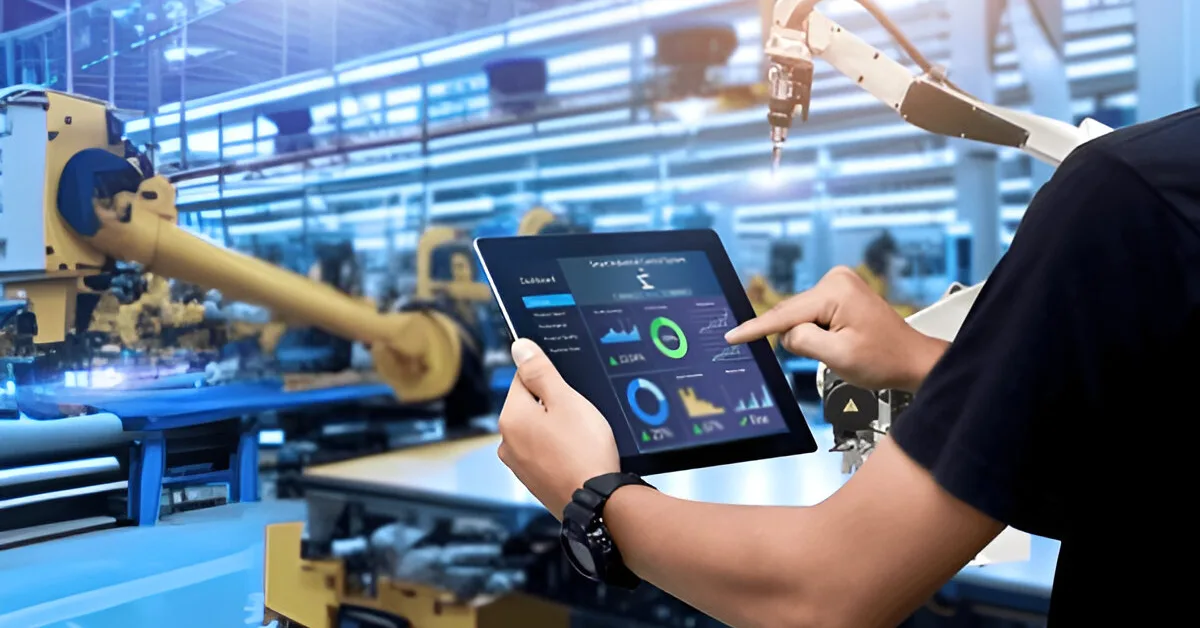Agility, precision, and efficiency are now critical for any manufacturing business aiming to stay competitive. Companies face constant pressure to deliver faster, reduce waste, and adapt to shifting customer demands while maintaining quality. This shift has brought in a new era of manufacturing that combines advanced connectivity with intelligent decision-making to transform operations from start to finish.
The latest advancements in smart manufacturing solutions for Industry 4.0 make this possible by enabling the integration of connected equipment, predictive analytics, and autonomous systems into production workflows. By deploying Internet of Things (IoT) devices and employing Artificial Intelligence (AI), organizations can incorporate real-time insights into their processes. This integration enables them to unlock higher productivity, achieve greater operational visibility, and realize measurable efficiency gains.
Understanding the Impact of IoT and AI on Smart Manufacturing
IoT and AI are transforming manufacturing through real-time monitoring, predictive analysis, and automated control, making operations more connected, responsive, and efficient. Smart manufacturing brings together physical assets, connected sensors, cloud computing, and intelligent software.
IoT links machines, systems, and people, while AI turns vast data into actionable insights. This connected ecosystem improves production line efficiency, boosts supply chain visibility, detects anomalies, predicts equipment failures, and adjusts schedules to maximize output and reduce downtime.
The Role of Data in Driving Smart Manufacturing
Without accurate, timely data, IoT and AI solutions cannot reach their full potential. Data fuels every decision and automation process in a smart manufacturing environment. IoT devices collect vast amounts of information, from machine health metrics to environmental conditions.
AI models then transform this raw data into meaningful insights, revealing patterns, predicting trends, and identifying opportunities for improvement. An advanced data management strategy is essential. Without it, the benefits of IoT and AI can be diminished by poor data quality, fragmented systems, or a lack of integration across departments.
Key Benefits Driving Industry Adoption
The adoption of IoT and AI in manufacturing is growing because of the tangible results they deliver. These benefits go beyond operational gains to impact long-term business growth and competitiveness.
1. Predictive Maintenance for Reduced Downtime
IoT-enabled sensors capture real-time machine performance data, which AI models then analyze to forecast potential failures. This approach allows maintenance teams to intervene before an issue escalates, reducing unplanned downtime and extending equipment life.
2. Enhanced Asset Performance
Monitoring key variables like temperature, vibration, and energy usage continuously helps in spotting areas for improvement. AI-powered optimization algorithms can then recommend process adjustments, resulting in higher throughput and reduced waste.
3. Agile Decision-making
With a constant flow of accurate, real-time data, managers can make faster, better-informed decisions. Production schedules can be adjusted based on shifts in demand, raw material supply, or quality control insights, enabling faster response to market requirements.
4. Energy Efficiency and Sustainability
IoT-based energy monitoring systems provide detailed visibility into consumption patterns. Combined with AI-driven analytics, they help pinpoint inefficiencies, reduce energy costs, and lower carbon footprints, supporting both cost savings and sustainability goals.
5. Workforce Empowerment
Augmented reality (AR) tools and mobile access to live operational data enable operators to work more effectively. AI-assisted diagnostics guide technicians through maintenance procedures, reducing errors and improving safety.
Overcoming Challenges in Implementation
Successful adoption of IoT and AI requires clear planning, skilled execution, and ongoing support. The main challenges involve technology integration, security, and workforce adaptation.
1. Integration with Legacy Systems
Older machinery may need retrofitting with sensors and connectivity modules.
2. Cybersecurity Risks
A connected environment increases the attack surface, necessitating advanced security measures.
3. Change Management
Employees must be trained and supported to adapt to new systems and workflows.
4. Scalability
Solutions should be designed with future growth in mind, ensuring they can handle expanding operations and data volumes.
Shaping the Future of Smart Manufacturing
The future of smart manufacturing will bring greater personalization, seamless interoperability, and integration with renewable energy systems. IoT and AI will enable self-optimizing production lines, hyper-connected supply chains, and predictive models that anticipate market changes before they occur. Businesses adopting these technologies today will lead in innovation, equipped to meet evolving demands with agility.
Achieving this requires deploying equipment, devices, and systems built for efficiency, reliability, and scalability. Partnering with a reputed electrical brand can help implement the right solutions, leverage advanced automation, and ensure long-term operational resilience in an increasingly competitive and technology-driven industrial landscape.






